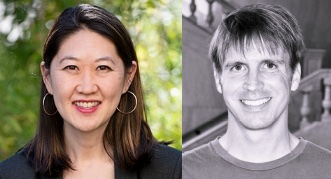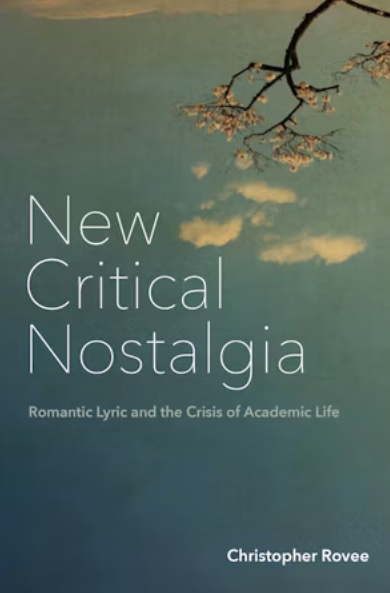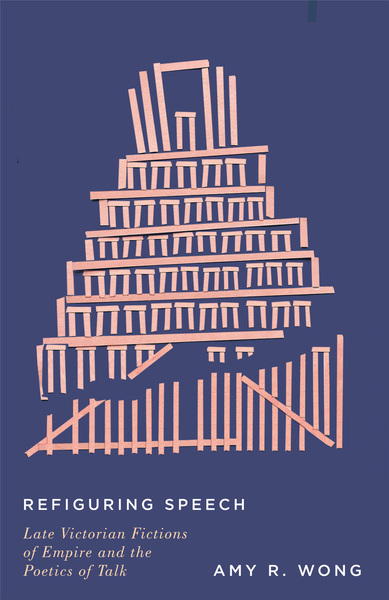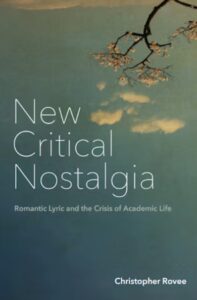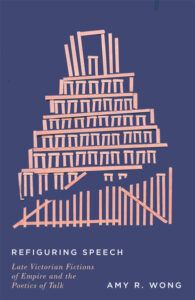City Lights in conjunction with Department of English/University of San Francisco, Department of English/Dominican University of California, Fordham University Press, and Stanford University Press present
A Nostalgia for English: Rethinking Language, Refiguring the Discipline
Amy R. Wong in conversation with Christopher Rovee, moderated by Omar F Miranda
Amy R. Wong and Christopher Rovee place the crises of English speech and language in the 19th century in dialogue with the current crisis of English studies in the 21st century. How can the historiography of nineteenth-century English–both the language and the field of study–help us to rethink English’s futures?
We celebrate the publication of the following books
Refiguring Speech: Late Victorian Fictions of Empire and the Poetics of Talk – By Amy R Wong – Published by Stanford University Press
and
New Critical Nostalgia: Romantic Lyric and the Crisis of Academic Life – By Christopher Rovee – Published by Fordham University Press
About Refiguring Speech:
In this book, Amy R. Wong unravels the colonial and racial logic behind seemingly innocuous assumptions about “speech”: that our words belong to us, and that self-possession is a virtue. Through readings of late-Victorian fictions of empire, Wong revisits the scene of speech’s ideological foreclosures as articulated in postcolonial theory. Engaging Afro-Caribbean thinkers like Édouard Glissant and Sylvia Wynter, Refiguring Speech reroutes attention away from speech and toward an anticolonial poetics of talk, which emphasizes communal ownership and embeddedness within the social world and material environment.
Analyzing novels by Robert Louis Stevenson, Bram Stoker, George Meredith, Joseph Conrad, and Ford Madox Ford, Wong refashions the aesthetics of disordered speech—such as parroting, eavesdropping, profuse inarticulacy, and dysfluency—into alternate forms of communication that stand on their own as talk. Wong demonstrates how late nineteenth-century Britain’s twin crises of territorialization—of empire and of new media—spurred narrative interests in capturing the sense that speech’s tethering to particular persons was no longer tenable. In doing so, Wong connects this period to US empire by constructing a genealogy of Anglo-American speech’s colonialist and racialized terms of proprietorship. Refiguring Speech offers students and scholars of Victorian literature and postcolonial studies a powerful conceptualization of talk as an insurgent form of communication.
About the author
Amy R. Wong is Associate Professor of English at Dominican University of California.
About New Critical Nostalgia:
New Critical Nostalgia weighs the future of literary study by reassessing its past. It tracks today’s impassioned debates about method back to the discipline’s early professional era, when an unprecedented makeover of American higher education with far-reaching social consequences resulted in what we might call our first crisis of academic life. Rovee probes literary study’s nostalgic attachments to this past, by recasting an essential episode in the historiography of English—the vigorous rejection of romanticism by American New Critics—in the new light of the American university’s tectonic growth. In the process, he demonstrates literary study’s profound investment in romanticism and reveals the romantic lyric’s special affect, nostalgia, as having been part of English’s professional identity all along.
New Critical Nostalgia meticulously shows what is lost in reducing mid-century American criticism and the intense, quirky, and unpredictable writings of central figures, such as Cleanth Brooks, Josephine Miles, and W. K. Wimsatt, to a glib monolith of New Critical anti-romanticism. In Rovee’s historically rich account, grounded in analysis of critical texts and enlivened by archival study, readers discover John Crowe Ransom’s and William Wordsworth’s shared existential nostalgia, witness the demolition of the “immature” Percy Shelley in the revolutionary textbook Understanding Poetry, explore the classroom give-and-take prompted by the close reading of John Keats, consider the strange ambivalence toward Lord Byron on the part of formalist critics and romantic scholars alike, and encounter the strikingly contemporary quantitative studies by one of the mid-century’s preeminent poetry scholars, Josephine Miles. These complex and enthralling engagements with the romantic lyric introduce the reader to a dynamic intellectual milieu, in which professionals with varying methodological commitments (from New Critics to computationalists), working in radically different academic locales (from Nashville and New Haven to Baton Rouge and Berkeley), wrangled over what it means to read, with nothing less than the future of the discipline at stake.
About the author
Christopher Rovee is Robert Penn Warren Professor of English at Louisiana State University. He is author of Imagining the Gallery: The Social Body of British Romanticism.
About the evening’s moderator
Omar F. Miranda is Associate Professor of English and Comparative Literature. He received his PhD in English and American Literature from New York University and specializes in the literatures of the eighteenth and nineteenth centuries, especially their transnational, global, and diasporic contexts. He is currently working on a book manuscript that tracks the origins and rise of the culture of global celebrity in the Romantic period. He is also part of an editorial team assembling the new Routledge Handbook to Global Literature and Culture in the Romantic Era. His recent article, “The Global Romantic Lyric” (The Wordsworth Circle, 2021) won the Bigger 6 Article of the Year award in 2022 from the Centre for Eighteenth Century Studies (CECS) at the University of York, UK.
Made possible by support from the City Lights Foundation

